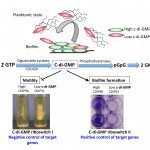Lien vers Pubmed [PMID] – 26330515
MBio 2015;6(5)
UNLABELLED: Clostridium difficile is the cause of most frequently occurring nosocomial diarrhea worldwide. As an enteropathogen, C. difficile must be exposed to multiple exogenous genetic elements in bacteriophage-rich gut communities. CRISPR (clustered regularly interspaced short palindromic repeats)-Cas (CRISPR-associated) systems allow bacteria to adapt to foreign genetic invaders. Our recent data revealed active expression and processing of CRISPR RNAs from multiple type I-B CRISPR arrays in C. difficile reference strain 630. Here, we demonstrate active expression of CRISPR arrays in strain R20291, an epidemic C. difficile strain. Through genome sequencing and host range analysis of several new C. difficile phages and plasmid conjugation experiments, we provide evidence of defensive function of the CRISPR-Cas system in both C. difficile strains. We further demonstrate that C. difficile Cas proteins are capable of interference in a heterologous host, Escherichia coli. These data set the stage for mechanistic and physiological analyses of CRISPR-Cas-mediated interactions of important global human pathogen with its genetic parasites.
IMPORTANCE: Clostridium difficile is the major cause of nosocomial infections associated with antibiotic therapy worldwide. To survive in bacteriophage-rich gut communities, enteropathogens must develop efficient systems for defense against foreign DNA elements. CRISPR-Cas systems have recently taken center stage among various anti-invader bacterial defense systems. We provide experimental evidence for the function of the C. difficile CRISPR system against plasmid DNA and bacteriophages. These data demonstrate the original features of active C. difficile CRISPR system and bring important insights into the interactions of this major enteropathogen with foreign DNA invaders during its infection cycle.





